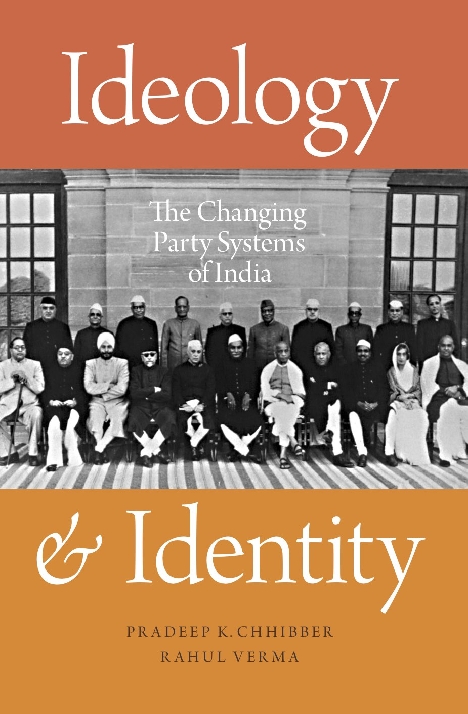A talk by PhD candidate in Political Science at UC Berkeley, Rahul Verma on his upcoming co-authored (with Pradeep Chhibber) book, Ideology and Identity: The Changing Party Systems of India.
About the Book
Indian party politics, commonly viewed as chaotic, clientelistic, and corrupt, is nevertheless a model for deepening democracy and accommodating diversity. Historically, though, observers have argued that Indian politics is non-ideological in nature.
In contrast, Pradeep Chhibber and Rahul Verma contend that the Western European paradigm of ideology is not applicable to many contemporary multiethnic countries. Using survey data from the Indian National Election Studies and evidence from the Constituent Assembly debates, they show In more diverse states such as India, the most important ideological debates center on statism - the extent to which the state should dominate and regulate society- and recognition- whether and how the state should accommodate various marginalized groups and protect minority rights from majorities.
Praise for the Book
"Contrary to a dominant view of Indian voters as pawns traded by rapacious politicians, Chhibber and Verma permit India's citizens the capacity of reason and intellect. Ideology and Identity is a brave work of political theory bolstered by evidence from archives, opinion surveys, and government data that thrusts the study of Indian politics firmly into the 21st century." - Irfan Nooruddin, Hamad bin Khalifa Al-Thani Professor of Indian Politics, School of Foreign Service, Georgetown University
"This book's claim that in ethnically hierarchical and lower-income democracies like India, ideology should be viewed as a combination of what the state should do, both in society and economy, and how marginalized communities can be incorporated in the polity, is worthy of serious consideration. The arguments here will spawn many new thoughts, reflections and arguments." - Ashutosh Varshney, Brown University
"This ambitious study makes a provocative argument about Indian politics. And, it also helps explain why elections in the developing world are often less chaotic, corrupt and clientelist than expected. By showing how late state formation leads to meaningful ideological cleavages, Chhibber and Verma point to new ways to think about when and why elections show stable patterns in the developing world." - Peter Kingstone, King's College London
"This book offers an alternative to the standard interpretation of Indian politics in terms of clientelism. It shows that ideology matters, even if it does not fit in the usual right vs left pattern. Besides the rise of Hindu nationalism, the rejection of state intervention in favor of positive discrimination or redistribution bear testimony of this ideological factor. This emphasis on the role of ideas (or prejudice!) refreshingly rehabilitates political culture as a key dimension of India's public sphere." - Christophe Jaffrelot, CERI,Sciences Po/CNRS
Speaker Bio
Rahul Verma is pursuing a Ph.D. in Political Science at the University of California, Berkeley, with a focus on comparative politics and political behavior. His research includes voting behavior, party politics, political violence, bureaucracy, and democracy. His ongoing doctoral dissertation focuses on understanding the nature of elite power in rural India.
He is associated with Lokniti-CSDS in Delhi. He also writes regular columns on Indian politics for two Indian Newspapers The Indian Express and The Hindu, and has published papers in Asian Survey, Economic and Political Weekly, and Studies in Indian Politics.
Prior to starting his Ph.D. at Berkeley, Rahul completed his M.Phil. in Political Science from Delhi University, M.A. in Development Studies from Tata Institute of Social Sciences (TISS), Mumbai and a B.A. from Kirori Mal College, Delhi University.
-------------------------
Event made possible with the support of the Sarah Kailath Chair of India Studies
Like us on FACEBOOK
Follow us on TWITTER
For DIRECTIONS to the Institute please enter "Institute for South Asia Studies" in your google maps or click this GOOGLE MAPS LINK.
PARKING INFORMATION
Please note that parking is not always easily available in Berkeley. Take public transportation if possible or arrive early to secure your spot.
The event is FREE and OPEN to the public.

